分词做状语
- 格式:doc
- 大小:31.50 KB
- 文档页数:4

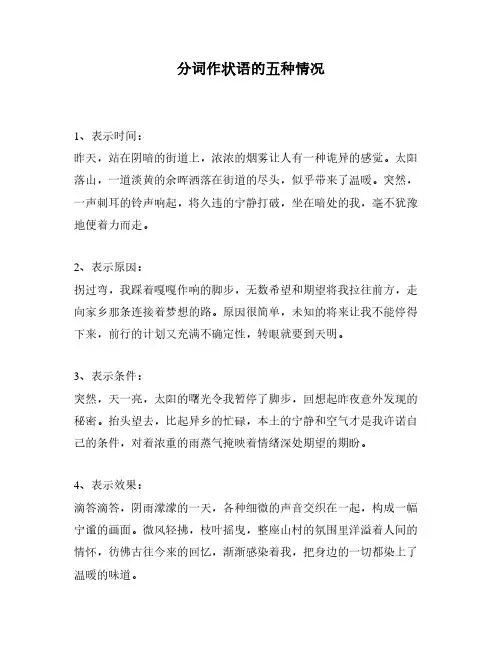
分词作状语的五种情况
1、表示时间:
昨天,站在阴暗的街道上,浓浓的烟雾让人有一种诡异的感觉。
太阳落山,一道淡黄的余晖洒落在街道的尽头,似乎带来了温暖。
突然,一声刺耳的铃声响起,将久违的宁静打破,坐在暗处的我,毫不犹豫地便着力而走。
2、表示原因:
拐过弯,我踩着嘎嘎作响的脚步,无数希望和期望将我拉往前方,走向家乡那条连接着梦想的路。
原因很简单,未知的将来让我不能停得下来,前行的计划又充满不确定性,转眼就要到天明。
3、表示条件:
突然,天一亮,太阳的曙光令我暂停了脚步,回想起昨夜意外发现的秘密。
抬头望去,比起异乡的忙碌,本土的宁静和空气才是我许诺自己的条件,对着浓重的雨蒸气掩映着情绪深处期望的期盼。
4、表示效果:
滴答滴答,阴雨濛濛的一天,各种细微的声音交织在一起,构成一幅宁谧的画面。
微风轻拂,枝叶摇曳,整座山村的氛围里洋溢着人间的情怀,彷佛古往今来的回忆,渐渐感染着我,把身边的一切都染上了温暖的味道。
5、表示方式:
趁着丝丝晨雾未散的时刻,抽出一伙人携手暗中离去,终于享受到了米饭之间的松软,延续着昔日快乐的痕迹。
把一切都收拾妥当,仿佛穿越时空一样,令一个个熟悉的瞬间再次涌现心中,萦绕着幽暗曾经的眼前。
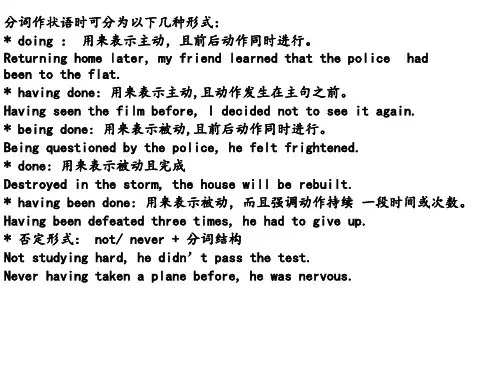
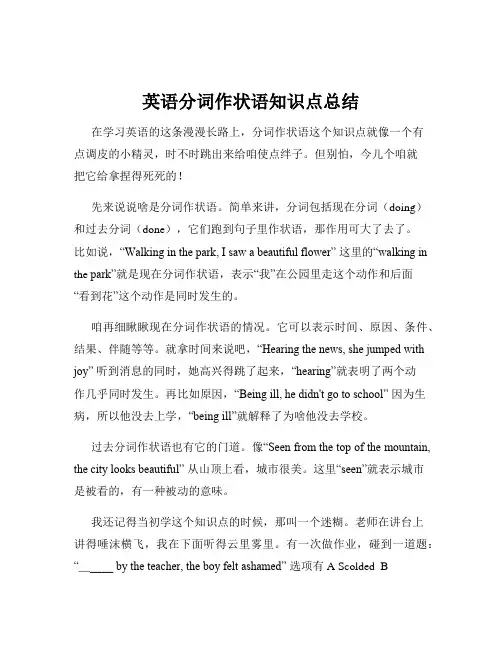
英语分词作状语知识点总结在学习英语的这条漫漫长路上,分词作状语这个知识点就像一个有点调皮的小精灵,时不时跳出来给咱使点绊子。
但别怕,今儿个咱就把它给拿捏得死死的!先来说说啥是分词作状语。
简单来讲,分词包括现在分词(doing)和过去分词(done),它们跑到句子里作状语,那作用可大了去了。
比如说,“Walking in the park, I saw a beautiful flower” 这里的“walking in the park”就是现在分词作状语,表示“我”在公园里走这个动作和后面“看到花”这个动作是同时发生的。
咱再细瞅瞅现在分词作状语的情况。
它可以表示时间、原因、条件、结果、伴随等等。
就拿时间来说吧,“Hearing the news, she jumped with joy” 听到消息的同时,她高兴得跳了起来,“hearing”就表明了两个动作几乎同时发生。
再比如原因,“Being ill, he didn't go to school” 因为生病,所以他没去上学,“being ill”就解释了为啥他没去学校。
过去分词作状语也有它的门道。
像“Seen from the top of the mountain, the city looks beautiful” 从山顶上看,城市很美。
这里“seen”就表示城市是被看的,有一种被动的意味。
我还记得当初学这个知识点的时候,那叫一个迷糊。
老师在讲台上讲得唾沫横飞,我在下面听得云里雾里。
有一次做作业,碰到一道题:“_____ by the teacher, the boy felt ashamed” 选项有 A Scolded BScolding C To scold D Having scolded 。
我瞅了半天,心里那个纠结啊,感觉每个选项都好像对又好像不对。
最后一咬牙,选了个 B,结果当然是错得一塌糊涂。
老师把我叫到办公室,耐心地给我讲解:“这道题是过去分词作状语,表示被动,被老师批评,所以应该选 A 呀。
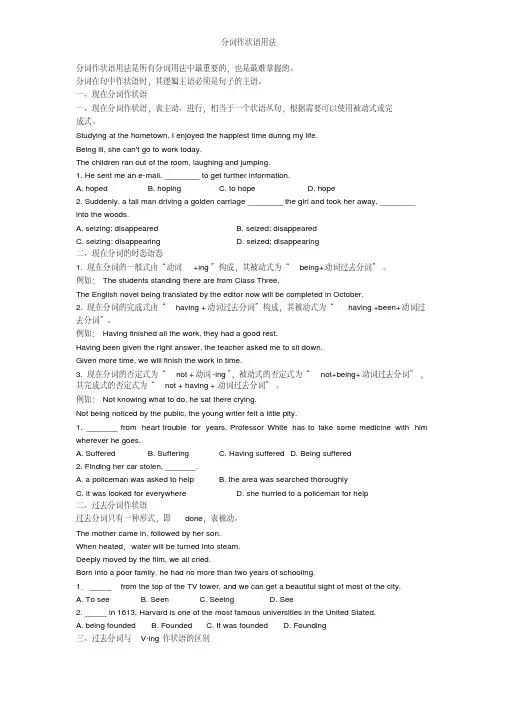
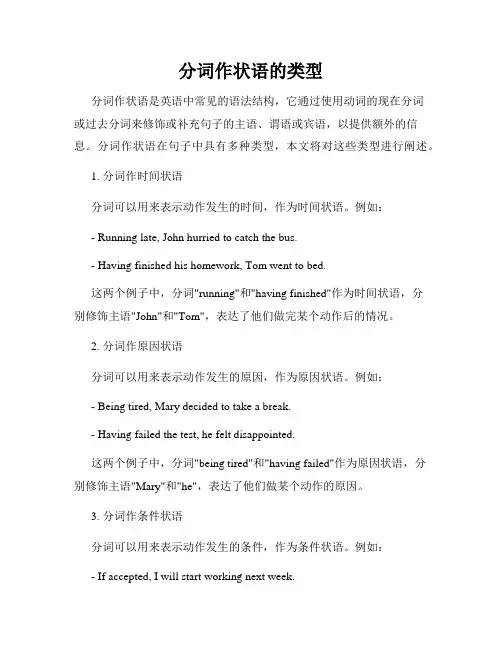
分词作状语的类型分词作状语是英语中常见的语法结构,它通过使用动词的现在分词或过去分词来修饰或补充句子的主语、谓语或宾语,以提供额外的信息。
分词作状语在句子中具有多种类型,本文将对这些类型进行阐述。
1. 分词作时间状语分词可以用来表示动作发生的时间,作为时间状语。
例如:- Running late, John hurried to catch the bus.- Having finished his homework, Tom went to bed.这两个例子中,分词"running"和"having finished"作为时间状语,分别修饰主语"John"和"Tom",表达了他们做完某个动作后的情况。
2. 分词作原因状语分词可以用来表示动作发生的原因,作为原因状语。
例如:- Being tired, Mary decided to take a break.- Having failed the test, he felt disappointed.这两个例子中,分词"being tired"和"having failed"作为原因状语,分别修饰主语"Mary"和"he",表达了他们做某个动作的原因。
3. 分词作条件状语分词可以用来表示动作发生的条件,作为条件状语。
例如:- If accepted, I will start working next week.- Without any money, he couldn't buy the ticket.这两个例子中,分词"accepted"和"without any money"作为条件状语,分别修饰主语"I"和"he",表达了他们做某个动作所需要的条件或限制。

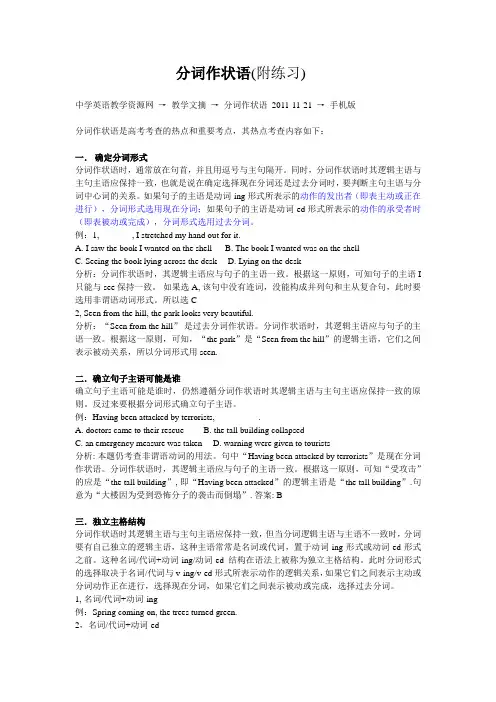
分词作状语(附练习)中学英语教学资源网→教学文摘→分词作状语2011-11-21 →手机版分词作状语是高考考查的热点和重要考点,其热点考查内容如下:一.确定分词形式分词作状语时,通常放在句首,并且用逗号与主句隔开。
同时,分词作状语时其逻辑主语与主句主语应保持一致,也就是说在确定选择现在分词还是过去分词时,要判断主句主语与分词中心词的关系。
如果句子的主语是动词-ing形式所表示的动作的发出者(即表主动或正在进行),分词形式选用现在分词;如果句子的主语是动词-ed形式所表示的动作的承受者时(即表被动或完成),分词形式选用过去分词。
例:1, _______, I stretched my hand out for it.A. I saw the book I wanted on the shellB. The book I wanted was on the shellC. Seeing the book lying across the deskD. Lying on the desk分析:分词作状语时,其逻辑主语应与句子的主语一致。
根据这一原则,可知句子的主语I 只能与see保持一致。
如果选A, 该句中没有连词,没能构成并列句和主从复合句,此时要选用非谓语动词形式。
所以选C2, Seen from the hill, the park looks very beautiful.分析:“Seen from the hill”是过去分词作状语。
分词作状语时,其逻辑主语应与句子的主语一致。
根据这一原则,可知,“the park”是“Seen from the hill”的逻辑主语,它们之间表示被动关系,所以分词形式用seen.二.确立句子主语可能是谁确立句子主语可能是谁时,仍然遵循分词作状语时其逻辑主语与主句主语应保持一致的原则。
反过来要根据分词形式确立句子主语。
例:Having been attacked by terrorists, _________.A. doctors came to their rescueB. the tall building collapsedC. an emergency measure was takenD. warning were given to tourists分析: 本题仍考查非谓语动词的用法。
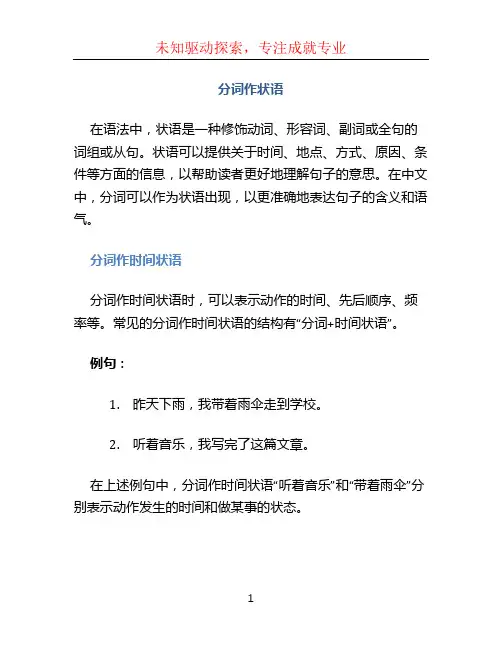
分词作状语在语法中,状语是一种修饰动词、形容词、副词或全句的词组或从句。
状语可以提供关于时间、地点、方式、原因、条件等方面的信息,以帮助读者更好地理解句子的意思。
在中文中,分词可以作为状语出现,以更准确地表达句子的含义和语气。
分词作时间状语分词作时间状语时,可以表示动作的时间、先后顺序、频率等。
常见的分词作时间状语的结构有“分词+时间状语”。
例句:1.昨天下雨,我带着雨伞走到学校。
2.听着音乐,我写完了这篇文章。
在上述例句中,分词作时间状语“听着音乐”和“带着雨伞”分别表示动作发生的时间和做某事的状态。
分词作地点状语分词作地点状语时,可以表示动作发生的地点或者动作的范围。
常见的分词作地点状语的结构有“分词+地点状语”。
例句:1.在花园里散步的时候,我发现了一只漂亮的蝴蝶。
2.躺在床上看书,我感到异常放松。
在上述例句中,分词作地点状语“在花园里散步的时候”和“躺在床上”分别表示动作发生的地点或者动作的范围。
分词作方式状语分词作方式状语时,可以表示动作的方式、方法等。
常见的分词作方式状语的结构有“分词+方式状语”。
例句:1.他用力地关上了门。
2.小明一边跳舞一边唱歌。
在上述例句中,分词作方式状语“用力地关上了门”和“一边跳舞一边唱歌”分别表示动作的方式。
分词作原因状语分词作原因状语时,可以表示动作的原因或动作发生的原因。
常见的分词作原因状语的结构有“分词+原因状语”。
例句:1.太阳下山了,天黑了。
2.因为下雨,所以他没有去散步。
在上述例句中,分词作原因状语“太阳下山了”和“因为下雨”分别表示动作发生的原因。
分词作条件状语分词作条件状语时,可以表示实现某种结果的条件。
常见的分词作条件状语的结构有“分词+条件状语”。
例句:1.如果你不努力学习,你就无法取得好成绩。
2.要是天气好,我们就去郊游。
在上述例句中,分词作条件状语“如果你不努力学习”和“要是天气好”分别表示实现某种结果的条件。
总结通过以上例句的分析,我们可以看出分词作状语能够丰富句子的表达,使得句子更加准确和生动。
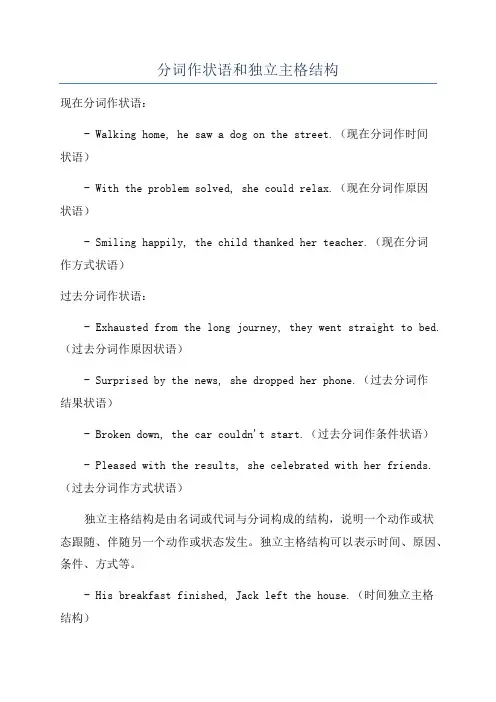
分词作状语和独立主格结构现在分词作状语:- Walking home, he saw a dog on the street.(现在分词作时间状语)- With the problem solved, she could relax.(现在分词作原因状语)- Smiling happily, the child thanked her teacher.(现在分词作方式状语)过去分词作状语:- Exhausted from the long journey, they went straight to bed.(过去分词作原因状语)- Surprised by the news, she dropped her phone.(过去分词作结果状语)- Broken down, the car couldn't start.(过去分词作条件状语)- Pleased with the results, she celebrated with her friends.(过去分词作方式状语)独立主格结构是由名词或代词与分词构成的结构,说明一个动作或状态跟随、伴随另一个动作或状态发生。
独立主格结构可以表示时间、原因、条件、方式等。
- His breakfast finished, Jack left the house.(时间独立主格结构)- The rain stopped, the players continued the game.(条件独立主格结构)- The cake eaten, the children happily played in the garden.(原因独立主格结构)- The teacher angry, the students were silent.(方式独立主格结构)需要注意的是,独立主格结构通常放在句子的开头或结尾,用逗号与主句分隔开来。
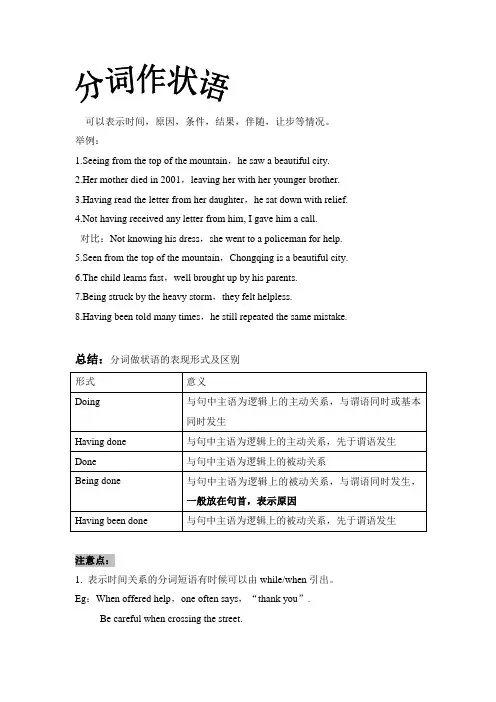
可以表示时间,原因,条件,结果,伴随,让步等情况。
举例:1.Seeing from the top of the mountain,he saw a beautiful city.2.Her mother died in 2001,leaving her with her younger brother.3.Having read the letter from her daughter,he sat down with relief.4.Not having received any letter from him, I gave him a call.对比:Not knowing his dress,she went to a policeman for help.5.Seen from the top of the mountain,Chongqing is a beautiful city.6.The child learns fast,well brought up by his parents.7.Being struck by the heavy storm,they felt helpless.8.Having been told many times,he still repeated the same mistake. 总结:分词做状语的表现形式及区别注意点:1. 表示时间关系的分词短语有时候可以由while/when引出。
Eg:When offered help,one often says,“thank you”.Be careful when crossing the street.2.有些分词货不定式短语作状语,其形式不受上下文限制,我们称其为独立成分。
常见的有:Generally/frankly speaking;Judging from/by;Considering/ taking .....into consideration;To tell you the truth;Seeing....考虑到;Supposing....假如,如果;Provided (that)....如果;3.独立主格的问题。
分词作状语例子
1. 哎呀呀,你看“Walking in the park, he suddenly saw a beautiful flower.”(他在公园里散步时,突然看到一朵美丽的花。
)这就是分词作状语呀。
2. 嘿,“Singing loudly, she attracted everyone's attention.”(她大声唱歌,吸引了所有人的注意力。
)这不就是很好的例子嘛。
3. 哇塞,“Looking out of the window, I saw a bird flying by.”(我望向窗外时,看到一只鸟飞过。
)是不是很形象呀。
4. 哟呵,“Running in the rain, he didn't feel cold at all.”(他在雨中奔跑,一点也不觉得冷。
)这效果多棒啊。
5. 哈哈,“Waving goodbye, they left the place happily.”(他们挥挥手道别,开心地离开了那个地方。
)多有意思呀。
6. 哎呀,“Thinking about the problem, she came up with a grea t idea.”(她在思考问题时,想出了一个好主意。
)分词作状语就是这么神奇呀。
7. 嘿嘿,“Smiling sweetly, the girl made everyone feel happy.”(那个女孩甜甜地微笑,让每个人都感到开心。
)这多生动啊。
我的观点结论就是:分词作状语真的很有用呢,可以让句子更加生动形象,表达更加简洁明了,大家一定要好好掌握呀!。
非谓语动词——分词作状语精讲与精练Traveling at a speed over 400 kilometers per hour, the train can complete the 30-kilometre journey in eight minutes.英语中,分词作状语主要分以下三种情况:一.分词充当状语时,分词的逻辑主语和主句的主语一致,即为“分词作状语”二.分词充当状语时,分词的逻辑主语和主句的主语不一致,即为“独立主格”三.独立主格一般需自带主语,若省去其主语,则为独立主格中的特殊情况,即为“悬垂分词”分词作状语分词在句中作状语,修饰谓语动词或整个句子,表示动作发生的原因、时间、方式、结果、条件、伴随状况等。
分词的否定式是在一般式和完成式的前面加not (never)+分词The student sat there, not knowing what to do. (否定形式)辨析:done与being done Painted white, the room looks bright.Being painted now, the room can’t be lived i n.___________ (use) as a means of transport in China, the bike is very useful.___________ (use) by me now, the bike can’t be lent to you.2. 句法功能常可转换成相应的状语从句。
有时为了强调,分词前可带when, while, once, if, though, as if, unless等连词一起作状语,以便使句子的意思更清楚、更连贯。
1) 表时间Walking in the street, I came across an old friend of mine.=When I was walking in the street, I came across an old friend of mine.(While) waiting for the bus, he read a copy of China Daily.=While ______________________ for the bus, he read a copy of China Daily.When offered help, one often says “Thank you.” or “It’s kind of you.”=When ______________________, one often says “Thank you.” or “It’s kind of you.”某些动词,如:hear, see, arrive, leave, return, get to, look, open, close等,表示一个极短暂的动作,它们的分词可换做on+动名词,译为“一(刚)…就…”。
分词作状语的时态与语态分词可以在句子中作为状语,描述动作或状态的时间、原因、条件等。
根据上下文,分词可以使用不同的时态和语态来表达不同的意思。
本文将就分词作状语时的时态和语态问题进行探讨。
分词的时态问题当分词作状语时,它通常具有与谓语动词相对应的时态。
下面是一些常见的时态情况:1. 一般现在时态:分词在句子中表示与主句谓语同时或经常发生的动作或状态。
一般现在时态:分词在句子中表示与主句谓语同时或经常发生的动作或状态。
例如:- She sat on the bench, reading a book.(她坐在长椅上看书。
)- The students left the classroom, chatting and laughing.(学生们边聊天边笑着离开了教室。
)2. 一般过去时态:分词在句子中表示与主句谓语同时或经常发生的过去动作或状态。
一般过去时态:分词在句子中表示与主句谓语同时或经常发生的过去动作或状态。
例如:- He stood by the window, looking at the street.(他站在窗前,望着街道。
)- They ran through the field, shouting and cheering.(他们跑过田野,边喊边欢呼。
)3. 完成时态:分词在句子中表示先于主句谓语发生的动作或状态。
完成时态:分词在句子中表示先于主句谓语发生的动作或状态。
例如:- Having finished her work, she went home.(她完成了工作,回家了。
)- After having read the book, he returned it to the library.(他读完了那本书后,将其归还到图书馆。
)分词的语态问题当分词作状语时,它也可以使用不同的语态来表达不同的意思。
下面是一些常见的语态情况:1. 主动语态:分词在句子中表示动作的执行者是主语。
分词作状语需要注意的问题:一. 表示伴随,行为方式He ran to me, holding a letter in his hand.Accompanied by his friends, he went to the railway station.He scratched his head, wondering how to solve the problem.She came back running.二.表示时间,相当于when, after 引导的时间状语从句Seeing this, we became worried. (When we saw this, we became worried.)Taking a key out of his pocket, he opened the door. (After he took a key out of his pocket, he opened the door.)Heated to 100 degree, water boils. (When water is heated to 100 degree, it boils.)三.表示原因,背景,状况,相当于because引导的状语从句Not having enough hands, we turned to them for help.Born in a poor family, he had only two years of schooling. Absorbed in his work, he neglected food and sleep.Not having received a reply, he decided to write again.Having finished the experiment, he left the lab.Having been giving such a good chance, hw could she let it slip away. 四.表示条件和假设,相当于if引导的状语从句Taken in time, the medicine will be quite effective.五.表示结果He fell down, striking his head against the ground and hurting it.六.独立主格形式(分词复合结构或独立结构)当上述的分词结构中主句的主语不是现在分词的动作发出者或过去分词的动作承受者时,分词有自己的主语Mother (being) ill, he didn’t go to school.With mother being ill, he didn’t go to school.Cf: Being ill, he didn’t go to school.Weather permitting, we shall go to the city park.Cf: Permitted, we shall go to the city park.The question (being) settled, we wound up the meeting.With the question being settled, we wound up the meeting.He came into the room, his face (being) red with cold.He came into the room, with his face being read with cold.七.已经成为固定用法的分词结构:Frankly speaking, I don’t like this dish.Judging from what you say, he has done a good job.Speaking of arts, do you like oil painting?Supposing (that) it rains tomorrow, will the sports meet be put off? General speaking, he is an honest man.Considering (that) you have finished your homework, you can watch TV now.Taking all things together, we have made quite a lot of money within the first month.Granting these differences, (姑且承认这些区别)Strictly speaking,Broadly speaking,Allowing for, (考虑到)Now try the following questions:1. Just as the value of telephone network increases with each new phone _____ to the system, so does the value of a computer system increase with each program that turns out.a. addingb. to have addedc. to addd. added2. There seemed little hope that the explore, ____ in the tropical forest, would find his way through it.a. to be desertedb. having desertedc. to have been desertedd. having been deserted3. All flights _____ because of the snowstorm, we decided to take the train.a. were canceledb. had been canceledc. having canceledd. having been canceled4. When _____ at the door, she was given a warm welcome.a. appearb. appearedc. appearingd. appears5. _____ from space, our earth, with water covering over 70% of its surface, appears as a “blue planet”a. Seeingb. Having seenc. To seed. Seen6. So many representatives _____, the conference had to be postpone.a. to be absentb. were absentc. being absentd. was absent7. No matter how frequently ______, the works of Beethoven always attract large audience.a. performingb. to be performedc. performedd. being performed8. The integrated circuit has reduced by many times the size of the computer, thus ____ a new generation of portable minicomputers. a. to create b. creatingc. createdd. creates9. When _____ about substances, the scientists find it convenient to classify them into solid, liquid, and gas.a. thoughtb. to thinkc. thinkingd. having thought10. It takes about an hour to get there, ______ possible traffic delays.a. it allowingb. its allowing forc. to allow tod. allowing for11. She had her arm ____ in an accident.a. to breakb. to be brokenc. brokend. breaking12. _____, she went back to her room.a. There is no cause for alarmb. Being no cause for alarmc. There being no cause for alarmd. Without having cause for alarm13. While reading the newspaper, _____.a. a colorful advertisement caught my eyesb.my attention was attracted by an advertisementc.I was attracted by a colorful advertisementd.What attracted my eyes was a colorful advertisement14. ______, he refused to give any explanationa.When asked to comment on the quality of the goodsb.When he being asked to commentc.When asking to comment on the quality of the goodsd.When he asked comment on the quality of the goods15. ____ a raining day, we gave up our plan to go for an outing.a. With itb. Beingc. Because it beingd. It being16. ____ in Beijing for many years, Mr. Park had little difficulty understanding Chinese.a. Having livedb. Livedc. Livingd. To live17. Little Mary ran back to the kitchen, eggs _____ carefully in her hands.a. were heldb. to be heldc. were being heldd. held18. The lecture ____, he left his seat so quietly that no one complained that his leaving disturbed the speaker.a. beganb. beginningc. having begund. had begun。